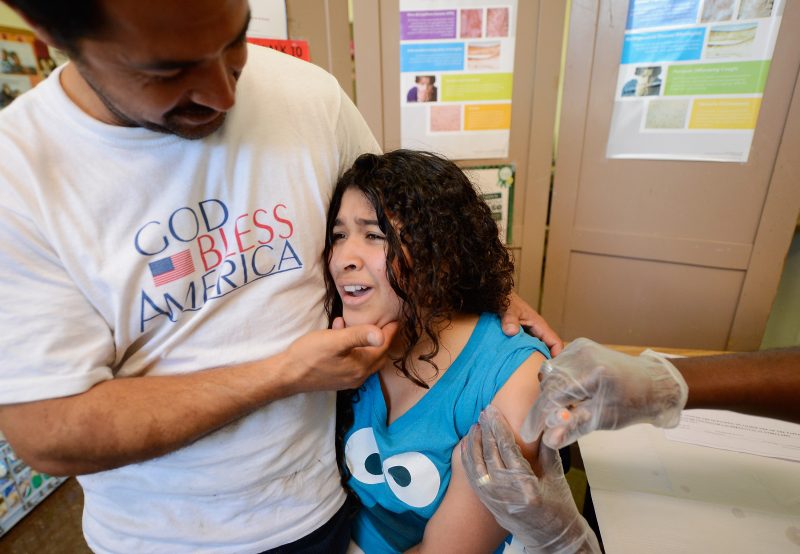US debates exemptions for child vaccination rules
An 11 year old girl is vaccinated against whooping cought in Los Los Angeles in 2012 (KEVORK DJANSEZIAN)
Washington (AFP) – A measles outbreak in the US has triggered debate on the ease with which parents can opt out of mandatory vaccine rules.
A total of 159 people have come down with the disease in 10 states since January, but one small area in particular, Clark County in Washington State, has illustrated the dangers of these exemptions, which are sought for religious, personal or philosophical reasons.
Just north of Portland, Oregon, Clark County accounts for 65 measles cases, 47 of them among children under age 10. In almost all 65 cases, patients had not been vaccinated.
Fifteen years ago, 96 percent of school children aged five in Clark County got measles shots. But in 2017-2018, the proportion was down to 84 percent.
In some schools, mainly private ones, the rate of use of the so-called MMR vaccination against measles, mumps and rubella was only 20 to 30 percent. In some of the schools, more than half the students had received exemptions.
Local lawmakers in Washington state have responded to the outbreak by advancing legislation that would do away with exemptions on personal or philosophical grounds. Opt outs for religious reasons would still be allowed.
Such exemptions are widely available in the United States. Only three of the 50 states — California, Mississippi and Virginia do not allow them.
California did away with exemptions for personal reasons in 2015. In the most populous US state, exemptions are permitted only for medical reasons.
In recent years other states have toughened their laws. Connecticut, for instance, requires parents claiming an exemption for religious reasons to provide a yearly, notarized statement to this effect. Since 2015, Delaware has allowed schools to temporarily exclude non-vaccinated kids.
Vermont wants to get rid of religious exemptions, after eliminating those sought for philosophical reasons four years ago, according to The Washington Post. Arizona, Iowa, Minnesota are also debating stricter laws.
– Congressional hearing –
The US Congress will hold a hearing Wednesday on the issue of vaccinating children.
Overall, the vaccination rate of kids in the US has remained stable, according to the Centers for Disease Control and Prevention, which monitors such trends closely.
It reports that in the 2017-2018 school year, around 95% of American kindergarteners were vaccinated against MMR, chicken pox and diphtheria, tetanus and whooping cough.
But the national rate masks wide disparities from state to state and even from one school to the next, as the case of Clark County illustrates.
And health authorities are alarmed because the previous school year was the third in a row in which requests for exemptions from vaccination increased, even though the rises were small.
And the proportion of kids reaching age two without having received any kind of vaccination is also growing, albeit slowly: 0.9 percent of children born in 2011 to 1.3 percent among those born in 2015. Vaccination-free kids were practically unheard of at the turn of the century.
Exemptions alone do not explain why children are not vaccinated. Many vaccines are recommended for American children in their first two years of life — the CDC advises they be used for 14 diseases — and this is hard for parents to keep up with, especially for vaccines that require three or four shots.
Another problem is access to health insurance. Children in families without such insurance make up a disproportionate amount of those who go without shots, according to the CDC.
In the Congress, the measles outbreak has prompted lawmakers to act.
The disease routinely infected American kids before a vaccine was introduced in 1963. Before that, it killed 400 to 500 people a year in the US. In 2000 it was declared eliminated. But since then, over the years anywhere from 50 to 600 cases have been reported annually.
Two US senators recently called on the CDC to explain what it is doing in response to what they called “pockets of unvaccinated people.”
Disclaimer: This story is published from a syndicated feed. Siliconeer does not assume any liability for the above story. Validity of the above story is for 7 Days from original date of publishing. Content copyright AFP.


